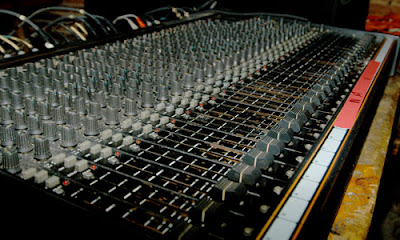Don't take it too seriously!
Let's Talk Sound Engineering
Wednesday, April 17, 2013
A Humorous Way to Appreciate What We Do
I found a video that I think demonstrates why Sound Engineers should be appreciated.
Don't take it too seriously!
Enjoy!
Don't take it too seriously!
Monday, April 15, 2013
The Future of Sound Engineering
Lately its been hip hop and alternative rock, and it seems that trance and house music is making a comeback. It is the job of the sound engineer to keep the music industry happy with the music they produce. It really has to be a lot of pressure, seeing as the world revolves around music!
The Values of a Sound Engineer
The work of a Sound Engineer, just like that of anyone else working in the arts, is only as valuable as the opinion of the people listening to it. If you work for months producing a song, but the audience it is meant for has no interest in it, it is of no value.
Being a successful sound engineer means making your audience happy; whether it is the artist you are recording or the possible fans you are attempting to appeal to. Engineering, by definition, means taking something that is good and making it better. This is no different for sound engineers. Their main value is the progression and the improvement of music as a whole. Musical expansion.
Being a successful sound engineer means making your audience happy; whether it is the artist you are recording or the possible fans you are attempting to appeal to. Engineering, by definition, means taking something that is good and making it better. This is no different for sound engineers. Their main value is the progression and the improvement of music as a whole. Musical expansion.
All This Music Jargon!
The sound engineering community has its own language. They use technical jargon to communicate on a level that is more practical and more efficient for them. The problem is trying to communicate with people who don't know what an oscillating track is, or what it means to lay down tracks simultaneously. Sound and recording engineers spend a lot of time communicating with the musicians themselves, meaning that sound engineers need to know how to speak is musical terms at well.
I think it really comes in handy to know how to read music in terms of chords and keys when it comes to working with the artists. Recording engineers take what sounds good already and makes it sound great. That means that the engineers are kind of like artists themselves!
So What Exactly Does a Sound Engineer Do?
Sound engineers "do" a lot of things, and usually a lot of things at once. As far as the "doing" aspect of this community goes, Sound engineers use modern technology like recording software and equalizers to manipulate sound and make it auditory more palatable.
According to the Institute for Career Research, "Recording engineers are the careerists most people think of when they think of audio engineering. Recording engineers work closely with recording artists and producers to deliver the kind of sound they are looking for."
Sound engineers produce most of the music that is out there today using computer programs, but there is still a lot of the organic element that the artist bring to the table in the music we hear!
Being a Sound Engineer
How does one come to be a sound engineer? Sound engineers usually go to a university or a technical school and get a degree in sound engineering. But that isn't enough! It takes years and years of apprenticeship to become a respected sound engineer.
Depending of the part of the field you go into, it can also take years of post bachelor's degree education to become a sound engineer. Sound Engineers work day in and day out to perfect the music that they create and record before it can be sent out to be listened to by the public.
Being a sound engineer means being the kind of person who can put in the time to me as meticulous as needed to absolutely perfect the music they are producing. Otherwise I have to believe it is very hard to be a successful sound engineer.
Recording: The Hardware Side
The hardware side of recording is just as complex as the software side of recording. For starters, you need instruments. Sound Engineers design instruments like guitars, drums, and keyboards specifically to make certain sounds based on their body shapes and acoustic qualities.
Depending of the size and shape of an acoustic guitar and the material it is composed of, it can have a brighter or deeper tone. The same goes for drums, pianos, and all instruments. From there you need a way to record the instrument. This usually comes in the form of a microphone or a "pickup" or a transducer that records mechanical vibrations, usually coming from a string instrument.
These signals are sent through cables into something called a mixer, which is essentially just a large EQ or equalizer where all the sound's elements are manipulated before going into the recording software. In the sound engineering community, you get what you pay for. Quality is nothing to be stingy about!
Subscribe to:
Comments (Atom)





